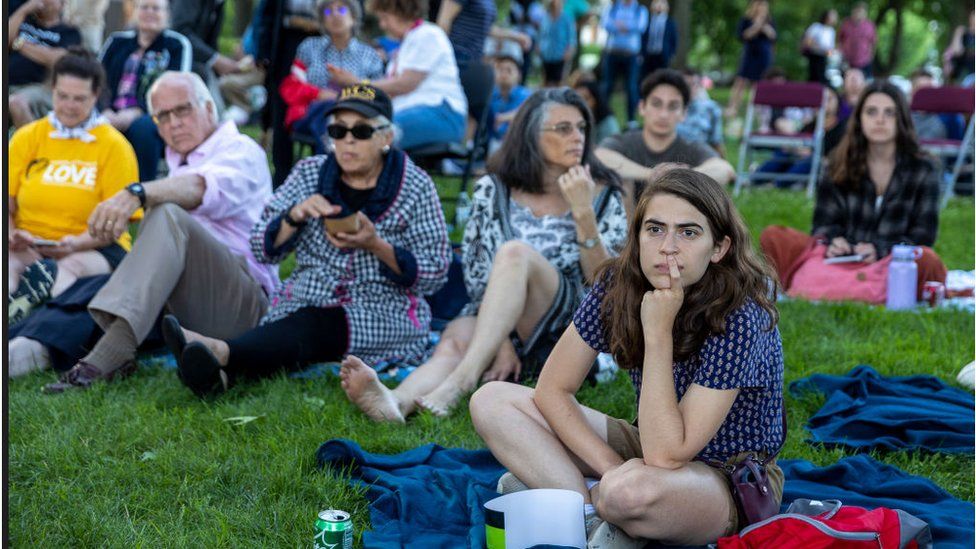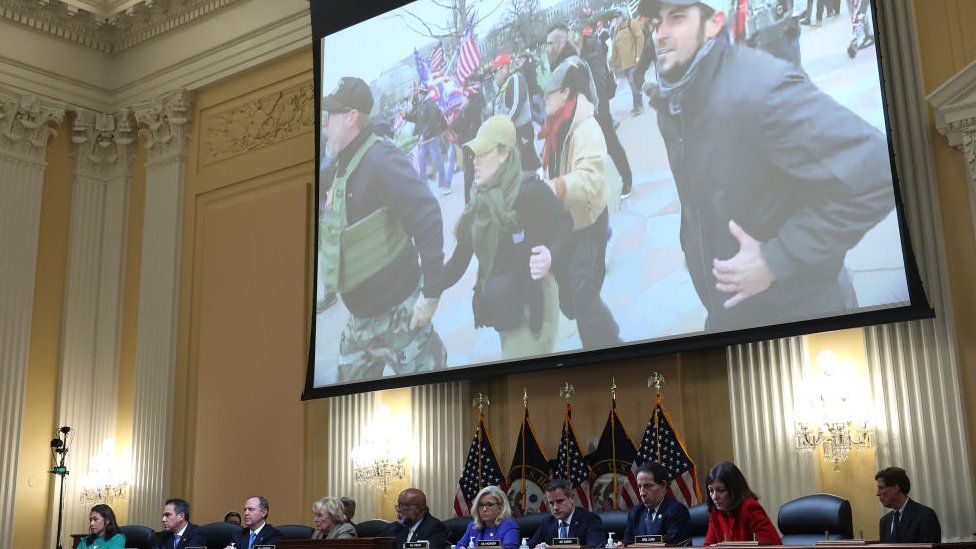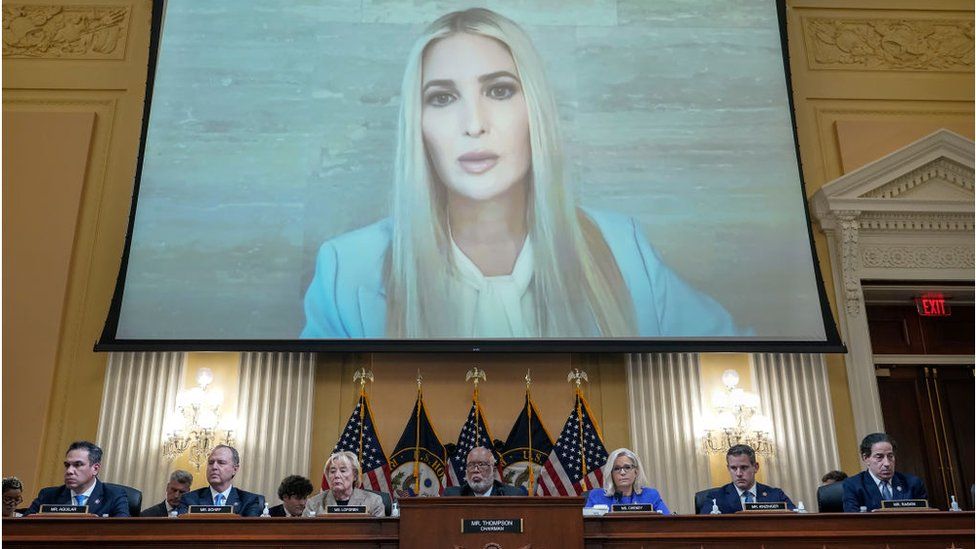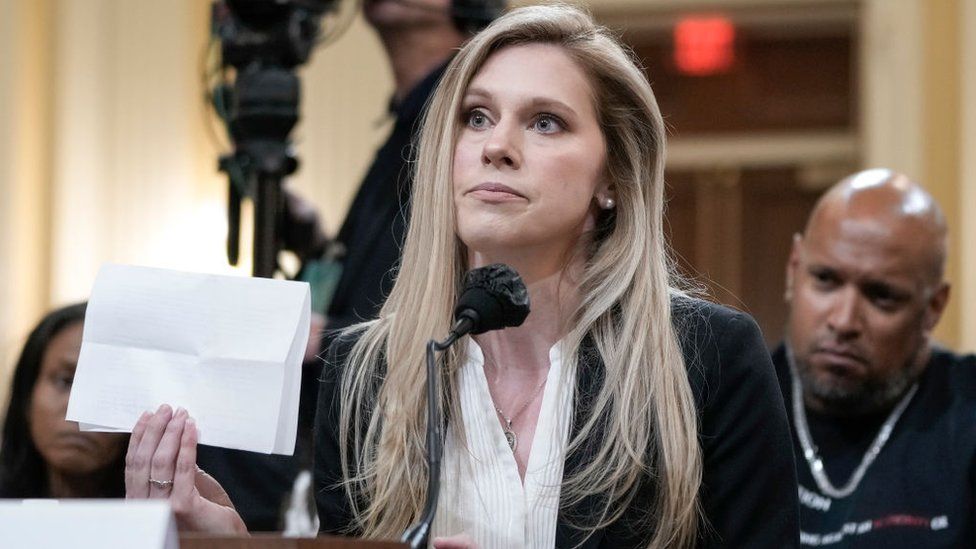 Getty Images
Getty ImagesAfter 11 months of work, the congressional committee investigating the 6 January 2021 attack on the US Capitol - and the events leading up to it - held its first public hearing to announce their findings.
It was an unprecedented evening affair. Even Watergate, which may have set the benchmark for modern high-profile and politically potent congressional hearings, conducted all their work during the day.
Democrats - and the two Republicans - on the committee insisted that it was important to present their work before a large American audience, both for history's sake and to set up legislative action to protect US democracy from future attacks.
The rest of the Republican Party, on the other hand, viewed the proceedings as a partisan show trial, one-sided and illegitimate.
With the three major networks, as well as every major cable news channel except Fox News, broadcasting the Thursday hearing in its entirety, the American public will have ample opportunity to make their own judgement.
A case against Donald Trump
If there were a question as to whether committee chairman Bennie Thompson holds Donald Trump personally responsible for the attack on the US Capitol, he put that to rest early in his opening statement. The then-president, he said, "was trying to stop the peaceful transfer of power".
"Donald Trump was at the centre of this conspiracy," he added.
Those are strong words. Now the committee has to present evidence to back that up.
It raises the question of whether, if this is what Mr Thompson and others truly believe, the committee will recommend that the former president himself be charged with a crime.
Within minutes of Thursday night's opening hearing, the chairman essentially accused Mr Trump of committing one.
Baseless election allegations
Before the 6 January committee can prove that Mr Trump intentionally subverted the peaceful and proper transfer of power to Joe Biden, it had to prove that the then-president was knowingly spreading false information.
To do so, committee vice-chair Liz Cheney didn't try to refute all the specific claims the president and his supporters have advanced. Instead she simply recounted and played video testimony of the president's own advisors confirming that the election results were valid.
In one key clip, Bill Barr - the president's attorney general - recounted how he used a dismissive expletive to tell the president that his of widespread election fraud were baseless.
She was, in effect, damning the former president with his own team's words.

The power of video
The primetime hearing was billed as something other than an ordinary congressional event. Instead of members of Congress hogging the microphone, it would be a slickly produced undertaking that would use video clips and documentary evidence to tell a powerful story.
It didn't exactly begin that way. Although Mr Thompson kept his remarks fairly brief, Ms Cheney - the apostate Republican who has gone to war with her own party - spoke in a monotone for nearly half an hour.
While the allegations she made were serious, the words bogged down in lengthy paragraphs, numbered lists and "we will show you" expository statements.
It wasn't until the committee ran an extended video of the attack - comprised largely of security and police body camera footage, interspersed with Trump's speech excerpts and tweets - that the drama of the day's events became visceral, not cerebral.
As the video ended, the hearing room fell into silence - with many members of Congress watching as guests in the back of the room sat in stunned quiet and family of police officers who died after the attacks choking back tears.

Ivanka and Jared speak
The panel has conducted more than 1,000 interviews as part of its investigation so far, but three of those interviews - with Donald Trump's daughter Ivanka Trump, son Donald Trump Jr and son-in-law Jared Kushner - have been of particular interest. On Thursday night, the public got its first look, albeit a brief one, at what two of them had to say.
Ms Trump spoke about how she had no reason to doubt then-Attorney General Bill Barr when he said her father had lost the election. Kushner dismissed the threats of members of Trump's legal team quitting in protest against what they viewed as his illegal and unfounded election challenges as "whining".
The elder Trump son, on the other hand, was entirely absent.
There may be more video presented in future hearings, but if viewers were hoping for juicy familial conflict, the hearings didn't deliver.
This video can not be played
To play this video you need to enable JavaScript in your browser.
First-person emotion
The committee only had two individuals appear for in-person testimony during the evening's hearing - documentary filmmaker Nick Quested and Capitol Police officer Caroline Edwards.
While the former offered some insight into the preparations the far-right group the Proud Boys made before the Capitol attack, it was Officer Edwards whose personal account lent the second half of the proceedings its power.
She spoke about the crowd turning on the police officers at the Capitol and how she saw leaders of the Proud Boys seemingly conferring before they launched their assault.

She recounted losing consciousness as she was knocked over, hitting her head on a concrete step. After she recovered, she continued to try to defend the Capitol, before she and Officer Brian Sicknick - who later died - were assaulted with chemical spray.
"What I saw was a war scene, like something I had seen out of the movies," she said. "I couldn't believe my eyes. Officers on the ground bleeding and throwing up... It was carnage. It was chaos."
Five key takeaways from the Capitol riot hearing - BBC
Read More
No comments:
Post a Comment